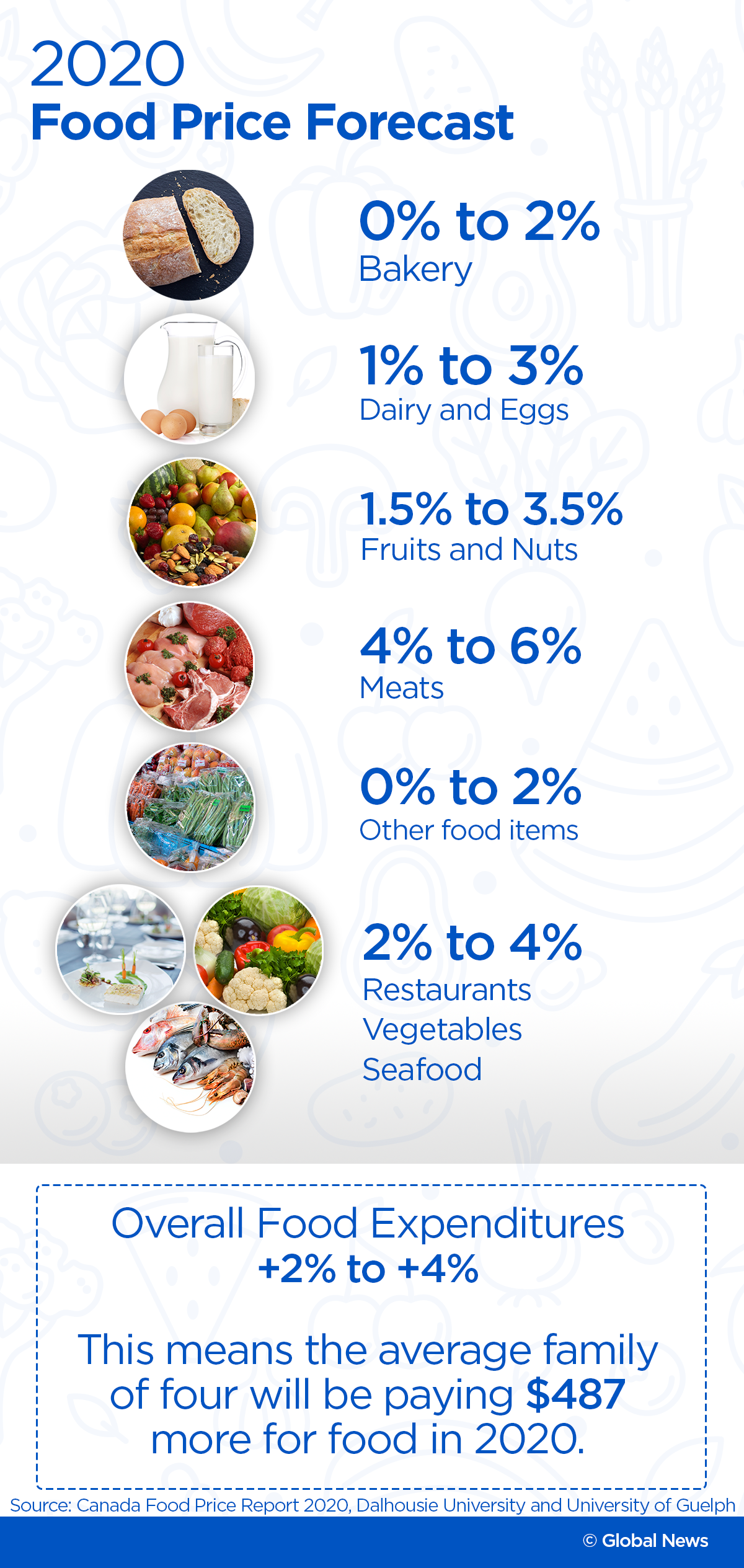The average Canadian family is expected to spend an additional $487 on food in 2020, a new report says.

Food prices in Canada are expected to rise between two and four per cent in Canada in 2020, the report released Wednesday by Dalhousie University and the University of Guelph indicated.
The 2020 forecast predicts that for the average family following Canada’s food guide, the total household food expenditure will increase to $12,667 annually.
The report says all food categories will see a rise in cost, but that the main drivers are increased prices for vegetables, fruit, meat and seafood.
According to the report, Canadians will see increasing prices as consumer preferences change, trade wars continue, global growth decelerates and wages stay constant while failing to adjust for inflation.
Meat prices are projected to rise the most, between four and six per cent. And, according to Simon Somogyi, co-author of the report and project lead for the University of Guelph, that estimate “might be a little conservative.”
“There are a bunch of factors that China is playing a big part in, that they’re trying to get as much meat from around the world as they can. They’ve had problems with African swine fever, which affected their domestic production. They’re buying up a lot,” he said. “So it could lead to some shortages across the U.S. and Canada. But more importantly, it’s just driving up the demand.”

The report said that in 2020 the major issues affecting food prices Canada include single-use plastic packaging, the impact of protectionist trade tactics from China and the U.S. on Canadian exports, the outbreak of illness from vegetables and ongoing agri-food innovation giving rise to more customizable and tailored food options for consumers.
And while Somogyi said the report is not “good news,” for Canadians, there are ways around it.
Firstly, he said, Canadians should grocery shop and cook at home as much as they can.
“The more you go out to eat at restaurants, well, it’s expensive. Cut back on eating outside of the home and it’ll be cheaper,” he said.
Additionally, he said that while the price of fresh fruits and vegetables may increase in 2020, Canadians should look to the frozen aisle.
“Frozen vegetables are nutritionally just as good as fresh stuff, sometimes even more nutritious,” he said. “They don’t just necessarily look as good or taste as good, but the frozen aisle is a great place to get vegetables.”
Province by province
Alberta, Saskatchewan, New Brunswick and Nova Scotia are expected to experience below-average food inflation rates in 2020.
Meanwhile, the report estimates Quebec, P.E.I., Manitoba and British Columbia will see higher than average food inflation rates due to stronger economic forecasts.
‘Elephant in the room’
According to the report, the “elephant in the room” that is likely to have a”very significant” effect on food prices in Canada in 2020 is climate change.
Canadian food systems will be affected by changing weather patterns, including droughts and forest fires, heavy precipitation, reduced freshwater access and rising sea levels, the report said.
“Climate models suggest that Canada’s agricultural regions will subsequently feel the impacts of a drier summer season and increased spring and winter precipitation,” the report reads. “Canadian farmers will face challenges in the future dealing with unpredictable crop yields, heat-wave livestock threats, pasture availability and pest and disease outbreaks.”

Researchers added, though, that if managed properly, climate change could help Canada improve soil by enhancing the carbon sequestration processes and reducing emissions of greenhouse gases through changes in land use.
The report also said that as Canada’s government works to implement the federal carbon tax, food prices will feel the repercussions.
“The carbon reduction paradigm in Canada could place the food and agriculture sector at a cost disadvantage as it compares to our neighbours south of the border,” the report said. “While the sector battles many climate-related issues, deals with global population growth, and increased demand for more and higher quality food products, the real question is how this can be done sustainably.”
Researchers said they are expecting the dilemma to “intensify even more” in 2020.

A ‘crisis’
Nick Saul, CEO of Community Food Centres Canada, says rising food prices point to a “crisis” that has been going on in Canada for years.
“There is a crisis going on in our country and people cannot afford food right now regardless of where these prices are going,” he said. “The more they go up, the more the crisis deepens. And that reflects itself in all sorts of ways — people not being able to participate fully in society, people getting sick. And if you look at all sorts of chronic diseases, they all come back to poverty.”
Saul said the crisis revolves around income inequality.
“At the end of the day, people need more income to make the decisions that they need to make for the health of themselves and their family,” he said. “Let’s ensure that people have the income they need to make the choices they need to make when it comes to putting food on the table.”
2019 food prices
Last year, the study projected food prices to rise by between 1.5 per cent and 3.5 per cent. The actual increase last year was 3.5 per cent.
Meat, seafood and vegetables were the only categories where the forecast proved inaccurate. In all three categories, prices increased more than anticipated due to unforeseen global events, researchers said.

“A weaker Canadian dollar helped exporters access foreign markets and gave incentives to importers to procure more from Canada,” the report reads. “But a rise in trade uncertainties with China weakened the market for pork exports, and African swine fever sent meat prices higher than anticipated because of tightening of the global pork supply.”
The report said vegetable prices increased in 2018 due to E. coli outbreaks, which drove up prices of other leafy greens, and seafood remained a “volatile” and “ecologically at-risk sector” in 2019.






Comments